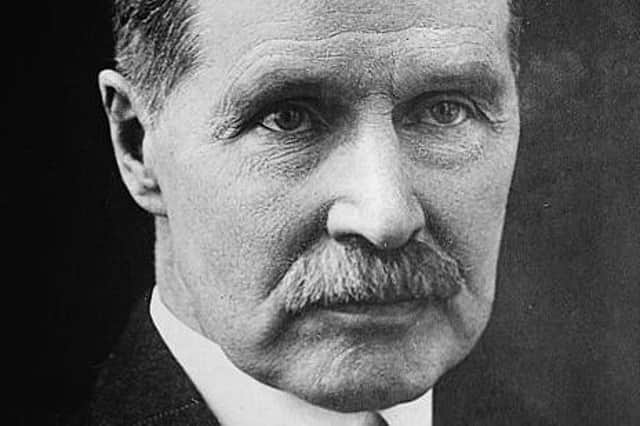Andrew Bonar Law is an often unheralded but key figure in history of Northern Ireland


Law was a Canadian by birth and Scots by descent but was more of an Ulster-Scot than he was ever Canadian or Scottish. (While Ulster-Scots lay claim to more than a third of the presidents of the United States, to date there has only been one Ulster-Scots prime minister of the United Kingdom – or two if you include Stanley Baldwin.)
As Lord Blake, Maynard Keynes and others have noted, Law was a strange figure to become ‘the leader of the Party of Old England, the Party of the Anglican Church and the country squire, the Party of broad acres and hereditary titles’ because he was a Presbyterian, was steeped in commerce and industry and cared nothing for titles or honours. The historian John Charmley has described him as ‘the sort of leader the Conservatives would turn to because they could find no one else’.
Advertisement
Hide AdAdvertisement
Hide AdBetween 1911 and 1915 Law was leader of the Opposition. During the two war-time coalitions he served as colonial secretary and chancellor of the Exchequer. From 1919-21 he was Lord Privy Seal and was briefly prime minister from 1922 to 1923.
No 20th-century Conservative leader waited so long for the premiership yet occupied the office for less time – 209 days. His short tenure is no reflection on his ability. Inoperable throat cancer alone curtailed his occupancy of 10 Downing Street, and he died exactly 100 years ago today on October 30 1923.
Although never a charismatic figure, Law was widely respected and trusted within the party. Lloyd George disparagingly described Law as ‘honest to the point of simplicity’. No one has ever been guilty of accusing Lloyd George of integrity.
In the general election of 1922 integrity was exactly what the electorate wanted, giving Law a healthy parliamentary majority of 75. (When Law became Conservative leader in 1911 Lloyd George had shrewdly observed: ‘The fools have stumbled on the right man by accident’.)
Advertisement
Hide AdAdvertisement
Hide AdA skilled debater, a superb parliamentarian and a master of detail, Law possessed ‘a very retentive memory and an unerring sense of political timing’.
R J Q Adams concluded his biography of Law in 1999 with the observation that Law’s greatest legacies were two: ‘The first is the existence of Northern Ireland as a part of the United Kingdom – a constitutional arrangement that will survive into the twenty-first century. His second gift, certainly more important to him than anything else in politics, was to the British Conservative Party, which he believed with all his heart could govern the nation better than any other. His leadership left it renewed and strengthened and set on the path towards generations of electoral success. By any standard, he has few peers in modern times as a political party leader’.
As the Ulster crisis unfolded, on July 27 1912, Bonar Law, speaking at Blenheim Palace, told his 13,000-strong audience: ‘I can imagine no length of resistance to which Ulster will go, in which I shall not be ready to support them, and in which they will not be supported by the overwhelming majority of the British people’.
Accordingly, much of the blame for the political stalemate between 1912 and 1914 is laid at the door of Law.
Advertisement
Hide AdAdvertisement
Hide AdDespite Law’s rhetoric, his views were moderate and his case reasonable. If Ireland, by virtue of history, religion, and race, merited special treatment from the rest of the UK, by the same criteria Ulster differed from the rest of Ireland and therefore, merited different treatment too.
Law also denied the right of the government to expel loyal and contented citizens from a community to which by birth they belonged and to place them under the rule of a Dublin Parliament. Law believed that Home Rule was not in the best interests of nationalist Ireland but if that was what nationalist Ireland wanted, he would waive his opposition to Home Rule, subject only to the proviso that Ulster should not be subject to Dublin rule.
Through the provisions of the Government of Ireland Act of 1920 Law achieved what had been his chief objective since 1912. In March 1920 he made the finest parliamentary speech of his career defending the proposed legislation against attack by Asquith.
As Conservative Party leader, Law twice rescued the party from potential oblivion.
Advertisement
Hide AdAdvertisement
Hide AdBefore the First World War he reorganised and revitalised Conservative Central Office, transformed the party’s finances and presided over the fusion of the Conservative and Liberal Unionist parties.
By ‘pulling no punches’ and mounting a direct frontal assault on Asquith’s Liberal government, he reinvigorated a dispirited party, gave it purpose and direction and between 1911 and 1914 made 15 by-election gains and lost only two by-elections. He would have won the general election due to take place in 1915 (which of course never happened because of the First World War).
After the war, on October 19 1922 at the famous Carlton Club meeting to discuss the continuation of the party’s coalition with Lloyd George’s Liberal Party, Law (and Stanley Baldwin) ensured the Conservative Party’s survival by rejecting the creation of a new centre party formed out of a merger with the Lloyd George Liberals.
Without Bonar Law neither the Conservative Party nor Northern Ireland might exist in 2023. Let us leave the last word to Lord Blake: ‘Carson may have been a more theatrical figure and a greater leader of the Ulster Protestant masses. Craig may have created the solid backbone of indigenous resistance. Yet without the uncompromising support of Bonar Law, without his much-criticised decision to pledge the whole of the English Conservative Party to the Ulster cause, it is very unlikely that Ulster would stand where she does today’.